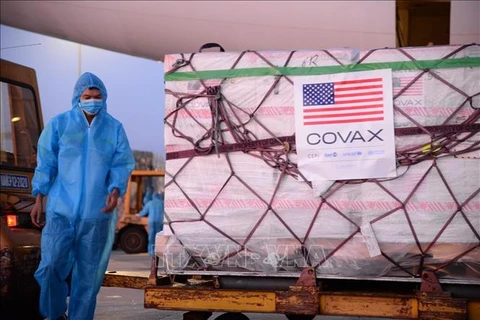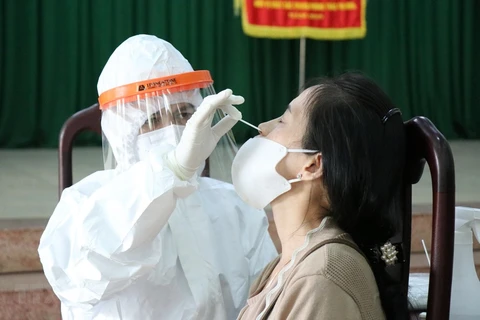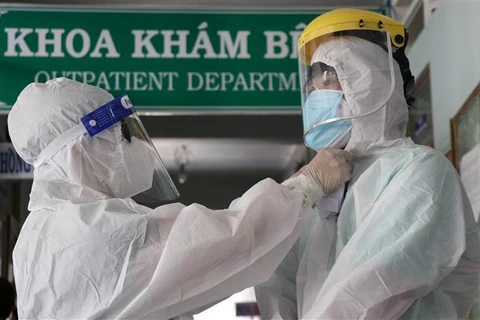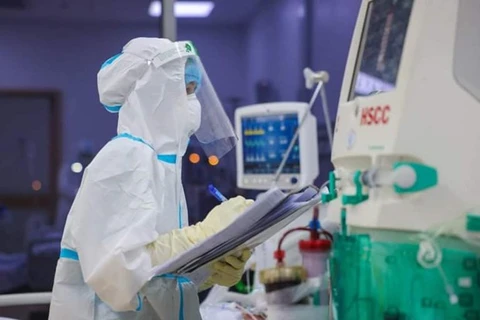HCM City (VNA) – The Vietnam Buddhist Sangha (VBS) of Ho Chi Minh City said on July 22 that it had sent an official dispatch to authorized agencies, proposing the use of its religious establishments as temporary COVID-19 treatment hospitals and quarantine facilities for Buddhist monks and nuns.
Amidst the complicated developments of the COVID-19 pandemic in HCM City, Most Venerable Thich Tri Quang, Deputy Patriarch of the Vietnam Buddhist Sangha and Chairman of the Executive Council of the HCM City Buddhist Sangha, sent the official dispatch to the city’s leaders and the Department of Health, asking for permission to use the Vietnam National Pagoda in district 10 and Pho Quang Pagoda in Tan Binh district as temporary COVID-19 treatment hospitals for Buddhist monks and nuns.
If approved by the city’s leaders and the Department of Health and provided with medical equipment and workers, the HCM City Buddhist Sangha will cover all accommodation and transport expenses.
He emphasised that this move will contribute to reducing the medical burden that is currently putting great pressure on hospitals and medical centres in HCM City.
The Most Venerable also suggested municipal authorities pay attention to giving vaccination against COVID-19 to Buddhist monks, nuns, and followers who are performing social charitable activities in support of the city’s COVID-19 fight. Currently, the Vietnam Buddhist Sangha in HCM City is providing more than 30,000 servings a day for medical workers and people in concentrated quarantine sites and COVID-19 treatment hospitals.
If health authorities accept, the Vietnam Buddhist Sangha in HCM City will quarantine Buddhist volunteers at its religious establishments when they test positive for SARS-CoV-2 or after they finish their charity activities./.
Amidst the complicated developments of the COVID-19 pandemic in HCM City, Most Venerable Thich Tri Quang, Deputy Patriarch of the Vietnam Buddhist Sangha and Chairman of the Executive Council of the HCM City Buddhist Sangha, sent the official dispatch to the city’s leaders and the Department of Health, asking for permission to use the Vietnam National Pagoda in district 10 and Pho Quang Pagoda in Tan Binh district as temporary COVID-19 treatment hospitals for Buddhist monks and nuns.
If approved by the city’s leaders and the Department of Health and provided with medical equipment and workers, the HCM City Buddhist Sangha will cover all accommodation and transport expenses.
He emphasised that this move will contribute to reducing the medical burden that is currently putting great pressure on hospitals and medical centres in HCM City.
The Most Venerable also suggested municipal authorities pay attention to giving vaccination against COVID-19 to Buddhist monks, nuns, and followers who are performing social charitable activities in support of the city’s COVID-19 fight. Currently, the Vietnam Buddhist Sangha in HCM City is providing more than 30,000 servings a day for medical workers and people in concentrated quarantine sites and COVID-19 treatment hospitals.
If health authorities accept, the Vietnam Buddhist Sangha in HCM City will quarantine Buddhist volunteers at its religious establishments when they test positive for SARS-CoV-2 or after they finish their charity activities./.
VNA
























